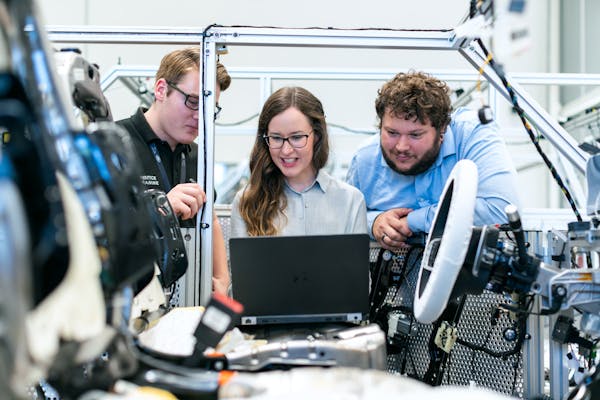**2024 Digital Marketing Trends in the Automotive Industry**
The automotive industry is navigating a digital transformation, with consumers increasingly shifting to online platforms. This change has prompted businesses to adopt cutting-edge digital marketing strategies to stay relevant. With innovations like electric vehicles (EVs) and autonomous cars, it’s crucial that marketing evolves alongside the industry. Below, we explore the top digital marketing trends shaping the automotive landscape in 2024.
### 1. **AI-Powered Personalization**
In today’s market, personalization is key, and customers expect brands to cater to their preferences. Artificial Intelligence (AI) plays a pivotal role in delivering this tailored experience. From AI-driven chatbots providing real-time customer support to algorithms that recommend vehicles based on browsing habits, AI helps automotive brands boost engagement and satisfaction.
AI tools, such as predictive analytics, enable marketers to anticipate customer needs and behaviors, allowing them to deliver customized email campaigns, social media ads, and personalized website experiences. This not only enhances user interaction but also drives higher conversion rates.
### 2. **Video Marketing and Virtual Showrooms**
Video content is reigning supreme in digital marketing, and the automotive industry is fully embracing it. Potential buyers are far more likely to engage with a virtual tour or a 360-degree video walkthrough of a car than read lengthy product descriptions. Platforms like YouTube, Instagram, and TikTok are proving to be invaluable tools for brands looking to showcase their vehicles in dynamic and engaging ways.
In addition, virtual showrooms are becoming increasingly popular. With virtual test drives and 3D configurators, customers can explore different car models without visiting a physical dealership. This level of convenience enhances the customer journey and reduces the pressure to make in-person visits.
### 3. **Influencer Marketing and User-Generated Content**
Influencer marketing is making waves in the automotive sector. Brands are collaborating with influencers, especially in the tech and lifestyle spaces, to promote their vehicles in authentic, relatable ways. These influencers have established trust with their followers, making them highly effective in driving consumer interest.
User-generated content, such as customer reviews and testimonials, is another powerful marketing tool. Brands are encouraging their customers to share their experiences and tag the company on social media. Genuine user feedback builds credibility and can significantly influence the purchasing decisions of potential buyers.
### 4. **SEO and the Rise of Voice Search**
Search Engine Optimization (SEO) remains crucial for automotive businesses, but the rise of voice search in 2024 is changing the game. With more people using voice assistants like Alexa and Google Assistant to search for information, brands need to optimize their content accordingly.
Long-tail keywords and conversational phrases are essential for capturing voice search queries. Additionally, local SEO is becoming more important for dealerships, as customers often look for nearby options when researching vehicles or service centers. Ensuring your website ranks well for both text and voice searches is key to attracting more organic traffic.
### 5. **Sustainability in Marketing**
As sustainability continues to be a growing concern, automotive brands are placing a greater emphasis on eco-friendly initiatives in their marketing. Companies that highlight their efforts to produce electric and hybrid vehicles, reduce emissions, or adopt sustainable manufacturing practices are gaining a competitive edge.
Digital marketing campaigns that focus on environmental responsibility resonate strongly with today's eco-conscious consumers. By promoting their green credentials, brands can attract customers who prioritize sustainability when making purchasing decisions.
### Conclusion
The digital marketing landscape in the automotive industry is evolving rapidly in 2024. By leveraging AI for personalized customer experiences, utilizing video content and virtual showrooms, collaborating with influencers, optimizing for voice search, and emphasizing sustainability, automotive brands can effectively engage with modern consumers. Keeping pace with these trends will not only boost brand visibility but also lead to increased customer loyalty and sales.


